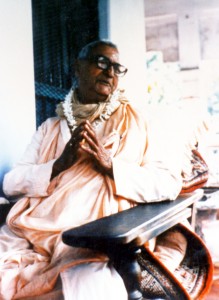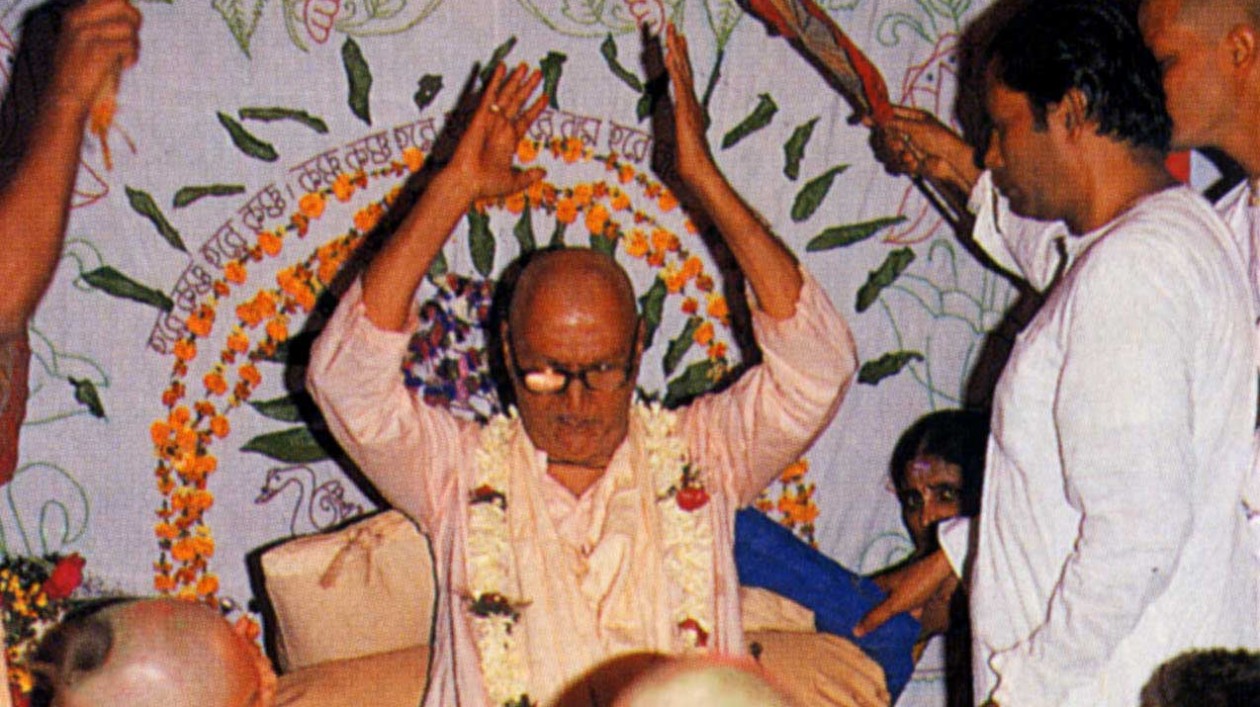 Real selflessness is not shown in the conception of renunciation, which is only mere withdrawal from the negative side. But there is a positive side of divinity: self-giving. And self-giving to the extreme will go to Krishna, the autocrat. He will absorb everything; He is the only enjoyer. Our Guru Maharaja, in his famous poetry wrote, “dusta mana! Tumi kisera vaisnava?” “My wicked mind, how can you claim to be a Vaishnava?” That is the heading of the poem written by our Guru Maharaja, Bhaktisiddhanta Saraswati Thakur. “Oh, my wicked mind, how can you think that you are a Vaishnava proper?” There he has given one line, “kaminir kama nahe tava dhama, tahara malika kevala yadav”, “the enjoyment, the pleasure, that one gets from the association of ladies should only be desired for Krishna, and no one else.”
Real selflessness is not shown in the conception of renunciation, which is only mere withdrawal from the negative side. But there is a positive side of divinity: self-giving. And self-giving to the extreme will go to Krishna, the autocrat. He will absorb everything; He is the only enjoyer. Our Guru Maharaja, in his famous poetry wrote, “dusta mana! Tumi kisera vaisnava?” “My wicked mind, how can you claim to be a Vaishnava?” That is the heading of the poem written by our Guru Maharaja, Bhaktisiddhanta Saraswati Thakur. “Oh, my wicked mind, how can you think that you are a Vaishnava proper?” There he has given one line, “kaminir kama nahe tava dhama, tahara malika kevala yadav”, “the enjoyment, the pleasure, that one gets from the association of ladies should only be desired for Krishna, and no one else.”
One gentlemen came to enquire, “what do you mean by this expression?”
“But what I mean there is clear.”
The man responded, “Then where is our position?”
“You have no position.” A clear answer.
None are to enjoy but Krishna. That is reserved for Him only. This is the “Krishna conception.” Also in Vaikuntha the tendency to be subservient prevails, although not so much so as in Krishna-lila.
A hard nut to crack
There are three things; Narayana is the master of kanak: money, wealth, aisvarya. All wealth, energy, belongs to Narayana. And all pratistha, the credit, belongs to gurudeva, Baladeva, Radharani. And all pleasure is reserved only for Krishna. It is very hard to crack the nut, to understand these three things. Then we can come to realise our position. If these three things are reserved for these three principal entities of the highest order, then what is our position? Where are we? And who are we? Our position is secondary in the objective side. With our wealth we may be suppliers to Krishna, in this respect. And the pratistha is all coming from Gurudeva. The main capitalist is Gurudeva – Baladava or Radharani in the original position. We are making transactions with his property. We are like small industrialists who take delivery of the articles from the big industriatist, and then take them to the market for ordinary sales. The Krishna consciousness we are spreading is like that. From Gurudeva we take the articles and sell them in the market. This refers to Krishna-katha, and to all other things.
We belong to a secondary, subordinate position. We are not owners of potency – we are but a part of the potency. Being constitutionally potency, we have no freedom to enjoy. The master of the potency is to enjoy it, and we are to supply His enjoyment. He is the master while we are many particles of potency, and thus our position is to be enjoyed, to be subservient to the higher. Herein lies our svarupa – our intrinsic identity. We shall be best situated if we can come to such an understanding. In a nutshell, this is Vaisnavism; we are not enjoyers – we are to be enjoyed. We are not positive – we are negative; we are not predominators – we are predominated.
For itself
Initially we will have to abandon both enjoyment and renunciation (bhoga-tyaga). And positively, we must come into connection with the plane of service (seva). This is possible by self-dedication and self-surrender. Such a conception is difficult to understand, and even more difficult to adopt and to follow. But the Supreme Lord is present. Because He is, everything is possible. Hegel’s statement, “The Absolute is for Itself,” assists us. Everything is for Him. This is the plenary movement of the Absolute, and we need to link ourselves with that movement.
Aham hi sarvva-yajnanam, bhokta cha prabhur eva cha: “I am the enjoyer of everything in this world. All sacrifices are to be performed knowing Me to be the recipient. This is Your relationship with Me.”
The blind man and the cripple
karyya-karana-kartritve hetuh prakritir uchyate
purusah sukha-duhkhanam bhoktritve hetur uchyate
(Bg 13:21)
The action of the body and senses is said to be supplied by prakriti, or material nature (dominated by the conditioned soul). And the soul, although marginal by nature, is said to think himself an enjoyer of happiness or a sufferer of misery, on account of misidentifying himself with mundanity. The pure soul, however, does not conceive himself to be an enjoyer or purusa.
Similarly, in sankhya philosophy, by the logic known as pangandha-nyaya -wherein a cripple is seated on the shoulders of a blind man and directs the blind man to his desired destination – the purusa (as the conditioned soul) is considered to be crippled and the prakriti (as material nature) is considered to be like a blind man who possesses full energy to move although he cannot guide. Thus, the guide is the purusa, who can see – the guide is consciousness, or intelligence. And the blind energy can move and work. The purusa possesses consciousness, and the feelings of pain and pleasure exist within that consciousness. Yet, his consciousness is inert and passive, and his activity is performed by the agency of another energy. This, in other words, is the conception of a lower plane of activity. Still, consciousness does not evolve from matter as supposed in any theory advocating “fossilism.”
The positive life of the soul
There is no necessity of movement for the soul in this mundane world. He is inactive, indifferent, passive in this lower enjoying plane. He does not participate in this negative plane of existence – he is meant for the positive side, in divinity. Yet, admitting the presence of the soul in the background, the prakriti or material nature works on his behalf.
Our Guru Maharaja gave this example: a minor may become the proprietor of an estate, and his managers, taking advantage of his youth, may loot and enjoy his estate. Similarly, the position of the conditioned soul (baddha jiva) is like that of a minor. He cannot control the rebellious managers. He must have the contact of a major soul, and with that help he can subjugate his managers and regain control of his own property.
Thus, a fallen soul’s position is just like that of a minor proprietor in a helpless situation. He is inactive and the managers are conducting all the affairs, but they are usurping everything in the name of the proprietor. The soul is inactive and non-participating. But his managers (body, mind, senses, etc.) are working on his behalf as though supported by him. If his real interest is aroused within his heart by a major soul who is connected with the Supersoul (Paramatma), the Supreme Lord (Bhagavan), the soul will achieve his intrinsic position. He will control the senses and utilise them in the service of the Lord, realising, “Everything is for Him: everything is for Krishna, not for me.”
